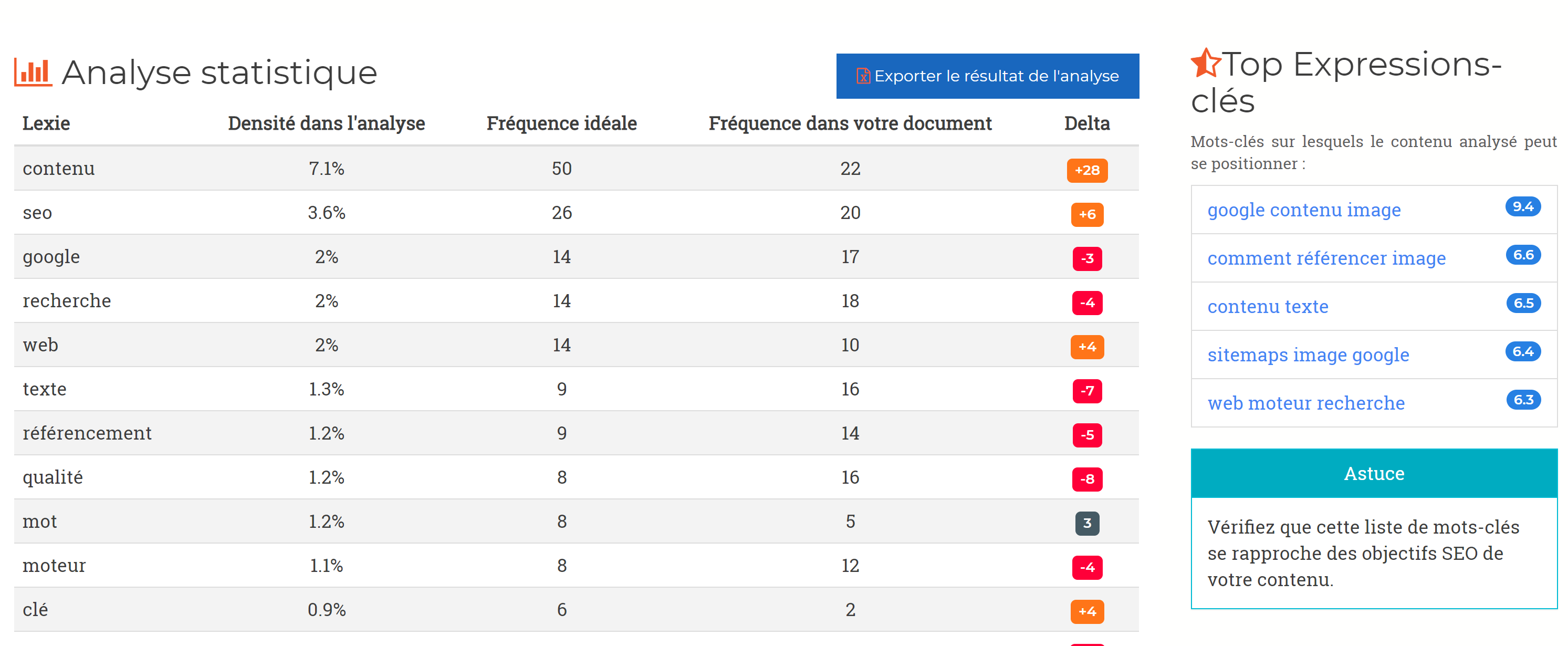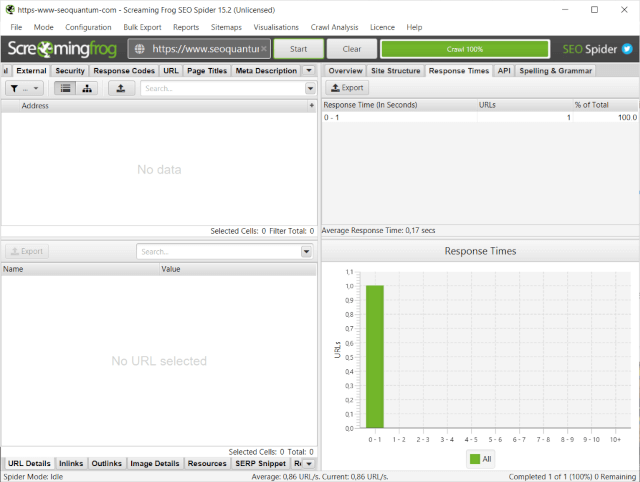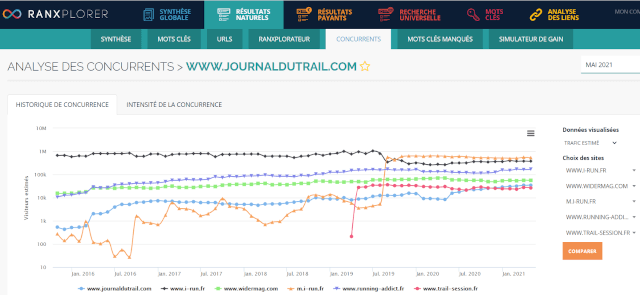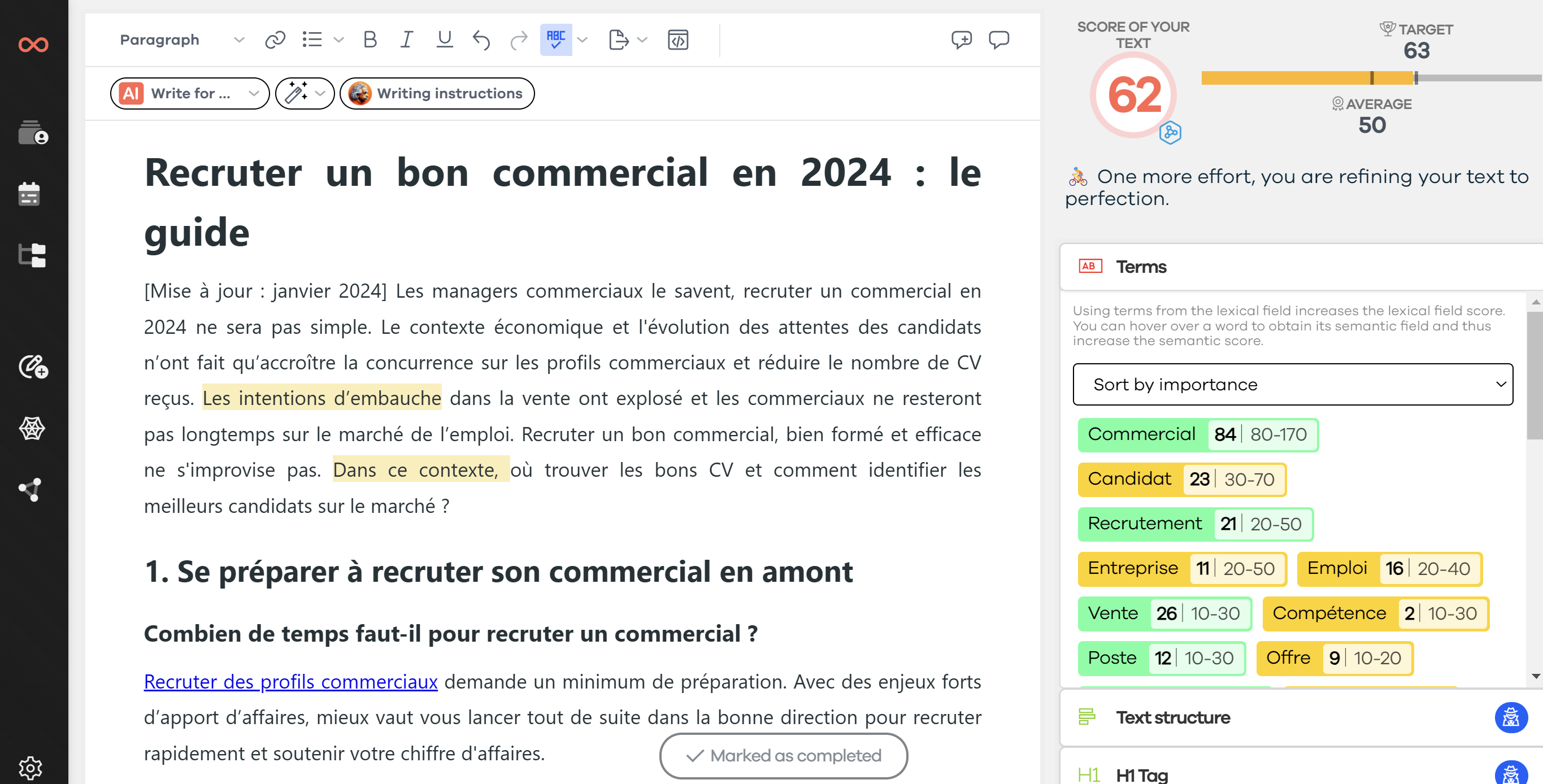Searching and analyzing your competitors' keywords is one of the best ways to optimize your organic SEO. Finding the keywords of a competitor allows you to improve your SEO strategy and gain a competitive advantage. In this article, we will learn how to identify the keywords your competitors use, evaluate their performance, and use this information effectively.
❓ What does analyzing your competitors' keywords entail?
A competitor's keywords are the phrases used by your competitor on which they are ranked, regardless of their position. Knowing these phrases will help you optimize your SEO strategy. Here are 4 ways to use the collected data:
- Steal your competitor's keywords and thus be ranked on the same expression.
- Find keywords that have not yet been used by your competitors.
- Discover general terms that you would not have thought of and that are used in your niche.
- Discover why your competitor's website is better ranked than yours on general keywords.
🔎 How to find a website's keywords?
If you hope to find a tool that automatically generates a list of keywords your competitors use in a few clicks, you will be disappointed. It is indeed not that simple. Although some tools are very handy, you will have to do manual research to compile a complete list of keywords. But this should not discourage you. Although there is not a tool capable of searching in one click all the keywords of your competitors, there are some strategies that simplify the research process.
The first step to finding a relevant keyword that attracts traffic to competitor sites is to brainstorm. On a piece of paper or an Excel file, write down all the keywords that come to mind to represent your brand, your products, or your services. To do this, always think about the user and the type of query they would be likely to type in the search bar. To help you in this work, you also have the option to click on the suggestions provided by Google when you enter a specific term.
Once this work is done, you can then move on to the next step and use tools available on the Internet. Below, I share with you my favorite tools to find and analyze the keywords that make your competitors visible on the Web.
🏆 Top 7 tools to find your competitors' keywords
Here are different tools, each with their respective advantages. For a complete analysis of your SEO competitors' keywords, I therefore advise you to use all of them. You will then know precisely in which direction you should direct your content marketing strategy!
1. Know a site's keywords through the source code of its page
This is the "old-fashioned" method and the most tedious. In your Internet browser, go to your competitor's website and choose the page for which you want to do the search. If you are not sure about your SEO competition, simply type the keyword you want to rank for. Then analyze each organic result present on the first page of the SERP.
Once you are on a competitor's site, right-click on the page to see the source code of the page (keyboard shortcut: CTRL + U). A window displaying the HTML source code of the page will appear. Look for keywords in the code, especially in the title tag, in the meta description, the meta keywords tag as well as all the alt and title tags of the images (for information, most websites no longer use the keywords tag - obsolete).

2. SEOQuantum: Text Analysis Tool
Do you want to extract keywords from a text? With its content analysis tool, SEOQuantum offers to find the keywords of a text via the URL of the page.
To conduct keyword research in a text, launch a semantic analysis, then go to the "Text Optimization" tab. Finally, enter your text or the URL to study.

3. Screaming Frog Spider
Use the Screaming Frog Spider software to perform a simple check of your competitor's site. Just download the software to your computer and use it to analyze your competitor's website. This tool is in English, but easy to understand and available in a free version. For SEO experts, a paid package (£149 per year) allows unlimited searches.
It works the same way as a search engine. You will get a lot of information, including metadata, alt tag, anchor text, title texts, and much more. All these components help to identify the keywords your competitor has targeted. Don't hesitate and start researching your competitor's keywords with Screaming Frog.

4. SEMRush
SEMRush offers a great tool that allows access to the ranking conditions of any domain. It's very simple: enter your competitor's website address and access the SEMRush list. Even if the handling can be difficult, its use is intuitive and the results offered are quite reliable. It's no wonder it's probably the most used SEO tool by SEO professionals!
SEMRush also provides the URL of the page that uses the keyword. This allows you to identify your competitor's posts that are particularly successful.

5. Ranxplorer
Ranxplorer is a French tool that displays Google's organic results based on a keyword. You just have to click on each URL to discover all the keywords it is ranked for. In addition, you can easily display a report comparing your organic traffic to that of your competitors. The filter provided also allows you to refine your analysis and optimize its quality.
Another advantage of Ranxplorer is that it offers very accurate results regarding the volume of searches per keyword. Indeed, unlike other tools, there is no grouping of volumes by keyword. The unique algorithm used by this tool remarkably differentiates each keyword. By adding up all the results obtained, you then get a very realistic idea of the potential linked to your main query.

6. Majestic SEO
MajesticSEO is a huge database that maps links on a web scale, the tool shows how pages and websites are linked. You can effectively study the link strategy (backlinks) implemented by your competitor and analyze each of the anchors (link text). Generally, the anchors contain the keywords your competitor wants to rank for.

7. BuzzSumo
BuzzSumo adds a very cool touch to the competitive keyword research process by changing its method. It indeed focuses on the social angle and sharing. By doing so, it "reverses" the research process. Here's how it works:

Instead of searching for your competitors' keywords, you choose the keywords that interest you and BuzzSumo provides you with the list of websites that use them. BuzzSumo shows you the most shared, liked content for any keyword.
The idea is to access successful content and analyze it to better understand the variations, types, and nuances that work well. This can also help you identify your "new" competitors. These are other websites that use the same keywords as you.
🛠 Other tools for analyzing your competitors' keywords
There are several online tools that easily provide the list of keywords used by your competitors. Our favorite advertising keyword research tools are SEMRush (free or premium) and Ahrefs.
You will find a complete list of complementary tools below:
- Yooda Insight (French tool, free and paid offer)
- SEObserver (French tool, paid offer)
- Ahrefs Keyword Explorer (paid offer)
- Moz Open Site Explorer (free and paid offer)
🕵️ How to benefit from analyzing your competitors' keywords
You have completed the analysis of your SEO competition's keywords using one of the tools we talked about. You have also checked which of your competitors' content works best and you now have a list of keywords. What's the next step?
There are different ways to use the information and keywords you have collected. For this research to influence your strategy, I advise you to follow the following steps:
- Use the collected data to compare yourself to your competitors and thus measure your success. This can be particularly useful over time to measure your growth against the competition.
- Look for the weaknesses in your strategy through your content and keywords.
- Get inspired by the keywords used by your competitors and design content adapted to these expressions. This is probably the best thing to do for your website.
- Analyze the expressions to better understand what your readers appreciate and are looking for.
- Find new competitors. It is crucial to know your competitors on search engines (SERPs).
I have just given you all my techniques to find your competitors' keywords on search engines. As always in organic SEO, this requires an investment in time (or money). However, you are not without knowing that by betting on SEO, you will establish your visibility on the Internet in a sustainable way. Therefore, take care to do this work carefully in order to put all the chances on your side to appear at the top of the SERP. This process is simply essential and is part of a complete analysis process of your SEO competition. By reading this blog post, you will know how to be recognized by Google as the undisputed specialist in your field of activity.
Need to go further?
If you need to delve deeper into the topic, the editorial team recommends the following 5 contents:
